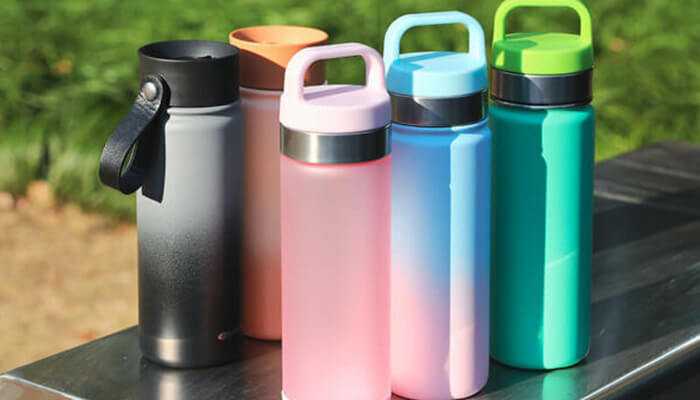In this period of natural and well-being cognizance, choosing the best water bottle has never been more pivotal. The compound bisphenol A (BPA), which is generally tracked down in plastic items, has ignited stress over its potential well-being suggestions. Thus, sans BPA water bottles have emerged as a famous and ethically dependable option in contrast to customary water bottles. In this article, we’ll examine the meaning of without BPA water bottles, their advantages, and why they address the eventual fate of hydration.
Recognizing BPA
Understanding what BPA is and why it has been an issue is critical prior to venturing into the universe of Sans BPA water bottles. BPA is an engineered substance that is utilized to make epoxy tars and polycarbonate plastics. These polymers are generally utilized in numerous ordinary items, for example, water bottles, newborn child jugs, and food holders.
BPA is a well-being risk in light of its penchant to debase food and beverages when presented with outrageous temperatures, daylight, or mileage. As an endocrine disruptor, BPA can possibly interface with the body’s hormonal framework and cause various medical conditions. These include issues with reproduction, delays in children’s growth, and even a higher risk of developing specific cancers. Here are the benefits of BPA-free water bottles.
Wellbeing and Security
The primary benefit of sans-BPA water bottles is the diminishing of potential well-being risks related to BPA openness. Your water will not contain any unsafe synthetic compounds in light of the fact that sans BPA plastics were not used to make these jugs, and that implies they are protected to utilize. This confirmation is fundamental for individuals who are stressed over their well-being and the drawn-out impacts of substance openness.
Environmentally Responsible
Comparatively speaking, BPA-free water bottles are more eco-friendly than BPA-containing ones. Traditional plastic bottles contribute to the global challenge of plastic pollution. By choosing BPA-free substitutes, you lessen your environmental impact and contribute to the effort to solve the problem of plastic pollution. The fact that many BPA-free bottles may be reused further cuts waste and saves resources.
Durability
Dependable water bottles are those made without BPA. They are less inclined to break over time than certain polymers that contain BPA. A sans bpa container will ultimately pay for itself because of its strength, which will lessen the requirement for successive substitutions and the rubbish it produces.
Versatility
BPA-free water bottles are available in a variety of materials, such as stainless steel, glass, and some types of plastic. You can select a bottle that fits your lifestyle and preferences thanks to the variety. Glass bottles offer a pure and non-reactive container for your beverages, while stainless steel bottles are great for keeping drinks cold or hot.
Improved Taste and Smell
Glass and stainless steel, two BPA-free materials, leave no taste or odor in your drink. This guarantees that your water will always taste clean and fresh, devoid of any plastic aftertaste that may exist in bottles made with BPA. Those who value the cleanest possible flavor in their beverages will find this feature particularly appealing.
Simple to Maintain
It’s simple to maintain and clean water bottles without BPA. Most of them can be put in the dishwasher, which makes it easy to keep them clean and free of stains or residual odors. You can have hassle-free access to clean and reviving hydration thanks to the ease of upkeep.
Hydration in the Future
BPA-free water bottles are anticipated to take over as our awareness of the value of environmental sustainability and individual health grows. They are leading the way for the following reasons:
Regulatory and Legislative
Many nations have put restrictions and prohibitions on the use of BPA in consumer products in response to public concerns. This has encouraged producers to switch to making BPA-free substitutes. BPA-free water bottles will become the norm as restrictions are tightened.
Goals for Sustainability
Sustainability is becoming a basic concept that both individuals and businesses are adopting. Water bottles without BPA support these sustainability objectives by minimizing plastic waste and adverse environmental effects. The use of BPA-free plastics or alternative materials like stainless steel and glass is now a top priority for many businesses when it comes to materials and packaging.
Design Innovation
Design innovation for water bottles has been sparked by the desire for BPA-free bottles. Bottles that are fashionable, useful, and ergonomically designed are being produced by manufacturers to suit a variety of consumer preferences. People now find it simpler to select BPA-free products that meet their particular lifestyles thanks to this innovation.
Conclusion
BPA-free water bottles have come out on top in the race to find sustainable and healthier options. They provide a wide range of advantages, including improved taste, durability, environmental friendliness, health and safety, and ease of upkeep. These bottles are evolving into the way people will stay hydrated in the future as consumer awareness increases.
Individuals can enjoy safe and worry-free hydration while supporting a healthy planet by switching to BPA-free water bottles. It’s a straightforward but significant decision that supports the ideals of environmental protection and individual well-being, clearly moving us closer to a better future.




